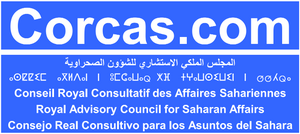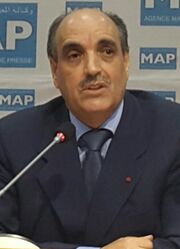المجلس الملكي الاستشاري للشؤون الصحراوية
| Conseil royal consultatif pour les affaires sahariennes | |
 | |
| استعراض الوكالة | |
|---|---|
| تشكلت | 25 مارس 2006[1] |
| المقر الرئيسي | 9 rue Bani Oulid, Rabat[2] 33°57′48.3264″N 6°48′42.9516″W / 33.963424000°N 6.811931000°W |
| تنفيذي الوكالةs |
|
| الموقع الإلكتروني | http://www.corcas.com |
|
هذا المقال جزء من سلسلة عن: | |
| خلفية تاريخية | |
|---|---|
|
حرب الصحراء الغربية • تاريخ المغرب • الصحراء الاسبانية • الجمهورية العربية الصحراوية الديمقراطية • المغرب الاسبانية • الحروب الاستعمارية في المغرب • جيش التحرير المغربي • حرب إفني • الرأي الاستشاري لمحكمة العدل الدولية • الأمم المتحدة في الصحراء الغربية • اتفاق مدريد • المسيرة الخضراء • الجدار المغربي • حقوق الإنسان في الصحراء | |
| مناطق متنازع عليها | |
|
الساقية الحمراء • وادي الذهب • الأقاليم الجنوبية • المنطقة الحرة | |
| السياسة | |
|
الوضع القانوني للصحراء الغربية • سياسة المغرب • السياسة • جبهة البوليساريو • أعضاء سابقون في جبهة البوليساريو • CORCAS • المبادرة المغربية للصحراء الغربية | |
| المتمردون | |
|
جيش التحرير المغربي • حركات التحرير • جبهة البوليساريون • إنتفاضة زلما • إنتفاضة الإستقلال | |
| مشاركة الأمم المتحدة | |
|
قرار مجلس الأمن رقم 1495 • القرار 1754 • بعثة الأمم المتحدة الزائرة • مينورسو MINURSO • خطة التسوية • اتفاقية هيوستن • خطة بيكر • مفاوضات منهاست | |
|
| |
The Royal Advisory Council for Saharan Affairs (العربية: المجلس الملكي الاستشاري للشؤون الصحراوية; فرنسية: Conseil royal consultatif pour les affaires sahariennes) is an advisory committee to the Moroccan government on Western Sahara. It was created under Mohammed VI in early 2006,[1] after a new autonomy plan proposed by Morocco to replace the United Nations' Baker Plan. The Polisario Front opposes Morocco's autonomy plan, demanding for a referendum and independence.
. . . . . . . . . . . . . . . . . . . . . . . . . . . . . . . . . . . . . . . . . . . . . . . . . . . . . . . . . . . . . . . . . . . . . . . . . . . . . . . . . . . . . . . . . . . . . . . . . . . . . . . . . . . . . . . . . . . . . . . . . . . . . . . . . . . . . . . . . . . . . . . . . . . . . . . . . . . . . . . . . . . . . . . .
Mission
The CORCAS is a consultative body for proposals related to what Morocco calls their Southern Provinces, CORCAS also defends Morocco's claim over Western Sahara in local media and abroad. The CORCAS fully condemns the refugee camps of Tindouf and the Polisario Front, citing human rights concerns.[5]
Composition
There are 141 members of CORCAS, mostly Moroccan Sahrawi politicians and tribal leaders. The members were appointed by the King of Morocco and support Morocco's claim on Western Sahara. Khalili Erguibi, the father of the late Polisario Front leader and SADR president, Mohamed Abdelaziz was a member of CORCAS until his death in 2017.[6][7]
The president of CORCAS, Khalihenna Ould-Errachid, founded the Partido de Unión Nacional Saharaui (PUNS) in 1974, the party supported the Spanish colonization of Spanish Sahara. After the departure of the Spanish in 1975 and the disbanding of the PUNS, Ould-Errachid pledged allegiance to the king of Morocco at the time, Hassan II and helped organize the Green March, he is an active defender of Morocco's claim over Western Sahara.[3]
International activities
Members of CORCAS are regularly featured in the Moroccan press. The president of CORCAS, Khalihenna Ould-Errachid, regularly attends meetings in international forums, such as the United Nations, where Western Sahara is discussed. Most notably, Ould-Errachid has met with the President of the People's Republic of China, Hu Jintao.[8]
Criticism
In 2008, a transcript from a 2005 Equity and Reconciliation Commission meeting regarding the Western Sahara War was leaked to Al-Jarida al-Oula, during the meeting, Ould-Errachid declared that "there are some people [...], about three or four Army officers who have committed what can be called war crimes against prisoners outside the scope of the war" and that "many civilians were thrown from helicopters or buried alive".[9]
In an interview with the independent Moroccan weekly magazine Le Journal Hebdomadaire, the ex-chairman of CORCAS' Human Rights Commission and head of the Association of Sahrawi Victims of Repression in the Tindouf Camps, El Houcine Baïda, criticized the lack of tackling human rights issues, and about the manner which Ould-Errachid runs the Council. In his opinion, the country's actions in the Western Sahara were alienating Sahrawis, and thus could push more youth towards what he defined as separatism. He further claimed that most of the organization's members had no knowledge of the government's autonomy plan - that they were supposedly responsible for drafting - and that president Ould-Errachid runs the council's affairs despotically, like "a new Franco".[10][11]
انظر أيضاً
- History of Morocco
- History of Western Sahara
- Sahrawi Arab Democratic Republic (SADR)
- Sahrawi National Council (SNC)
الهوامش
- ^ أ ب "Discours de SM le Roi à la Nation". CORCAS.
- ^ "Contact". CORCAS.
- ^ أ ب "Le President". CORCAS.
- ^ "Le Secrétaire Général". CORCAS.
- ^ "CORCAS Participates in Exhibition Denouncing Tragedy of Women Captive in Tindouf Camps". CORCAS.
- ^ "Liste des membres du Conseil Royal Consultatif des Affaires Sahariennes". CORCAS.
- ^ "رحيل والد الزعيم السابق لـ«بوليساريو»". aawsat.
- ^ "Le Président chinois reçoit M. Khalihenna Ould Errachid à Rabat". CORCAS.
- ^ LMRABET, ALI (2006-06-17). "Un responsable marroquí reconoce crímenes de guerra en el Sáhara". El Mundo.
- ^ Le Journal Hebdo[dead link]
- ^ "SAHARA : Deux membres du Corcas claquent la porte". La Gazette du Maroc. 2007-06-04.
وصلات خارجية
- Royal Advisory Council for Saharan Affairs (CORCAS) – Official site in (in عربية, إنگليزية, فرنسية, and إسپانية)
- Le CORCAS (in فرنسية)
- Video of CORCAS President Khalihenna Ould Errachid, introducing the mission of the council
- Pages using gadget WikiMiniAtlas
- Articles with dead external links from May 2013
- Coordinates not on Wikidata
- نزاع الصحراء الغربية
- Articles containing explicitly cited عربية-language text
- Articles containing فرنسية-language text
- Pages using Lang-xx templates
- Articles with إنگليزية-language sources (en)
- Articles with فرنسية-language sources (fr)
- Articles with إسپانية-language sources (es)
- سياسة المغرب
- سياسة الصحراء الغربية
- Political organizations based in Western Sahara


